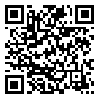Mon, Feb 2, 2026
| فارسی
Volume 11, Issue 2 (8-2005)
IJPCP 2005, 11(2): 150-163 |
Back to browse issues page
Download citation:
BibTeX | RIS | EndNote | Medlars | ProCite | Reference Manager | RefWorks
Send citation to:



BibTeX | RIS | EndNote | Medlars | ProCite | Reference Manager | RefWorks
Send citation to:
Hamidpour H, Sahebi A, Tabatabai M. Efficacy and Effectiveness of Beck’s with Teasdale’s Cognitive herapies in Treatment of Dysthymia. IJPCP 2005; 11 (2) :150-163
URL: http://ijpcp.iums.ac.ir/article-1-68-en.html
URL: http://ijpcp.iums.ac.ir/article-1-68-en.html
1- , hassan_hamidpour@yahoo.com
Abstract: (20071 Views)
Introduction: The aim of this research was to investigate the efficacy of Beck’s cognitive therapy versus Teasdale’s in treatment of dysthymia.
Method: Six subjects (two males and four females) were selected by convenient sampling and were randomly assigned to two treatment groups. The methodology was a multiple-baseline experi-�mental single case study. Subjects completed Beck’s Depression Inventory (BDI) and Depression- Anxiety-Stress Scale (DASS) at pre-treatment (baseline), treatment (4 and 8 sessions), post-treat-ment (twelfth session), and at follow-up (two months after treatment). Also, subjects completed the Dysfunctional Attitude Scale (DAS), and the Internal-External Control Scale (IECS) at pre-treat-ment (baseline) and post-treatment (twelfth session).
Results: The results revealed that both Beck’s and Teasdale cognitive therapies were effective in decreasing dysthymic symptoms that was more prominent with the latter method.
Conclusion: Teasdale’s cognitive therapy can be more effective than Beck’s in reducing dysthymic symptoms.
Method: Six subjects (two males and four females) were selected by convenient sampling and were randomly assigned to two treatment groups. The methodology was a multiple-baseline experi-�mental single case study. Subjects completed Beck’s Depression Inventory (BDI) and Depression- Anxiety-Stress Scale (DASS) at pre-treatment (baseline), treatment (4 and 8 sessions), post-treat-ment (twelfth session), and at follow-up (two months after treatment). Also, subjects completed the Dysfunctional Attitude Scale (DAS), and the Internal-External Control Scale (IECS) at pre-treat-ment (baseline) and post-treatment (twelfth session).
Results: The results revealed that both Beck’s and Teasdale cognitive therapies were effective in decreasing dysthymic symptoms that was more prominent with the latter method.
Conclusion: Teasdale’s cognitive therapy can be more effective than Beck’s in reducing dysthymic symptoms.
Type of Study: Original Research |
Subject:
Psychiatry and Psychology
Received: 2007/02/19 | Published: 2005/08/15
Received: 2007/02/19 | Published: 2005/08/15
| Rights and permissions | |
 |
This work is licensed under a Creative Commons Attribution-NonCommercial 4.0 International License. |



